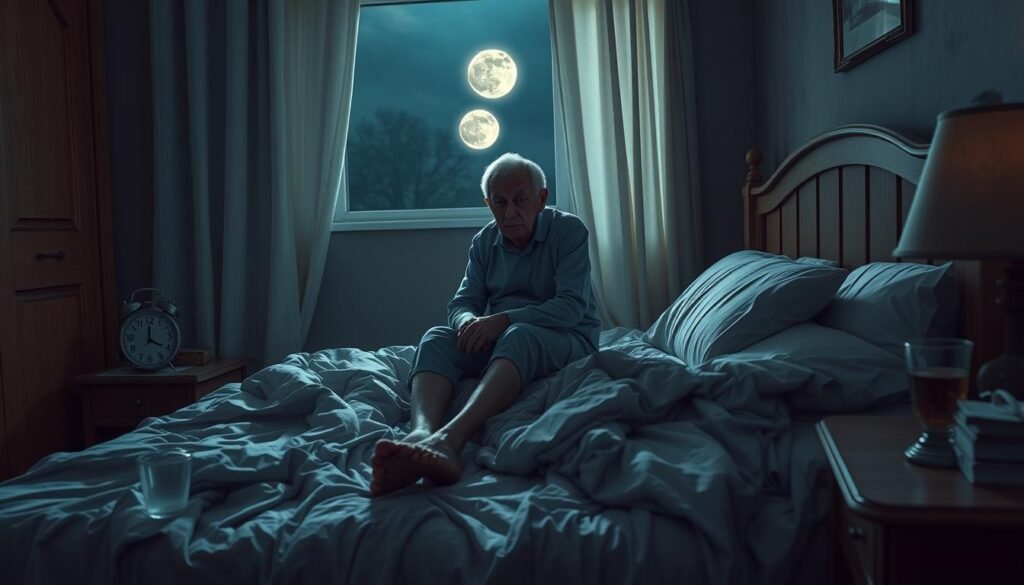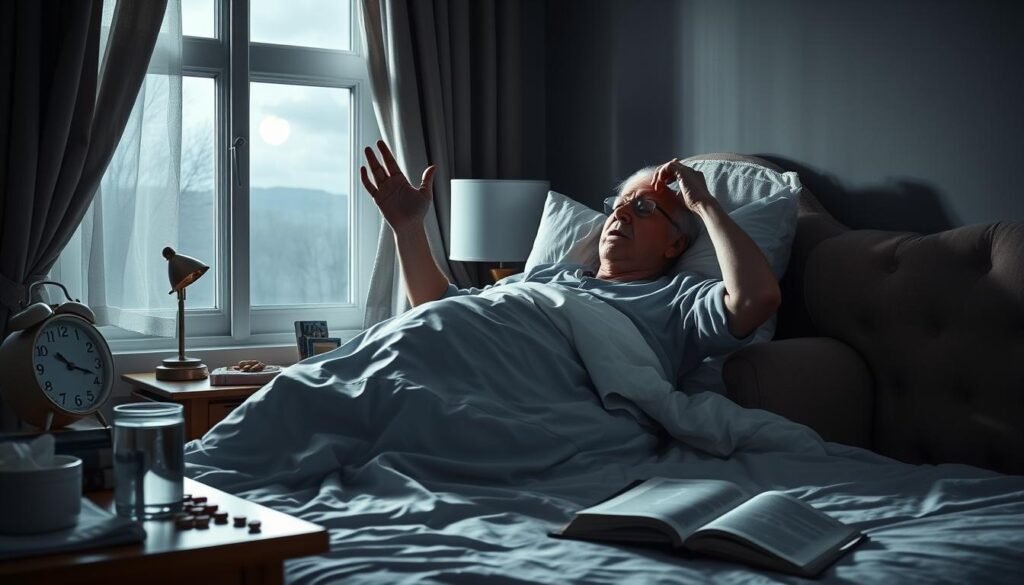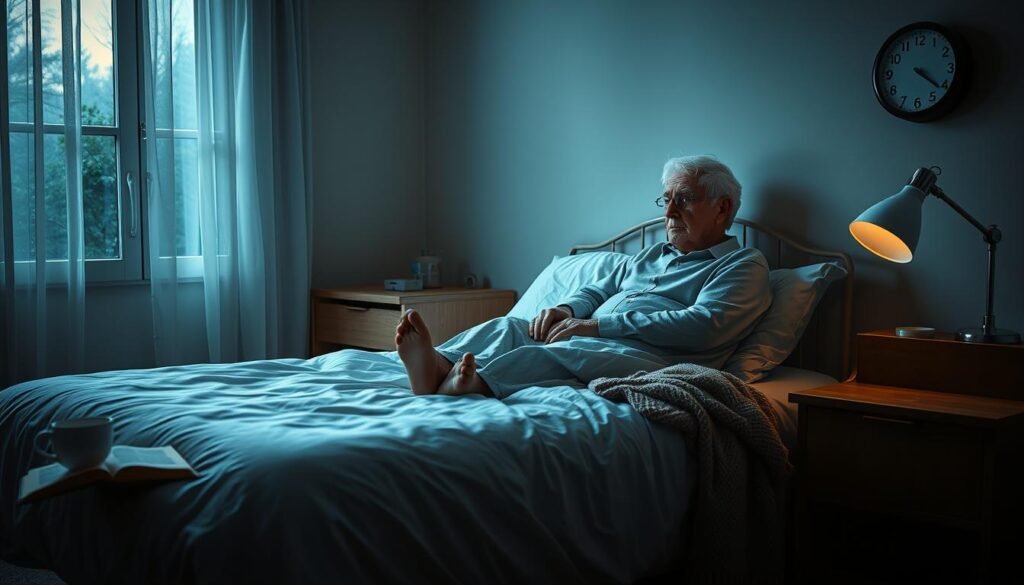Between 10 to 30% of adults struggle with insomnia. This issue becomes more common in those over 60. This makes it important to notice sleep problems in older adults. Insomnia is more than a small problem; it greatly changes the quality of life. It can lead to mental and physical health issues. Knowing the signs of insomnia in seniors helps their families and caregivers. They can then offer the right support and help. This can greatly improve their overall well-being.
Key Takeaways
- Insomnia affects 10-30% of adults, with a higher susceptibility in seniors.
- Aging leads to significant sleep challenges, including reduced slow-wave and REM sleep.
- Understanding the symptoms helps families support seniors facing insomnia.
- Non-pharmacological options are recommended for managing sleep disturbances in the elderly.
- Environmental and medical factors contribute to insomnia symptoms in older adults.
Understanding Insomnia in the Aging Population
Insomnia in older adults shows differently than in the young. It’s crucial to know how it affects seniors for proper care. The number of older people with insomnia is high, and it’s linked to serious health problems.
Definition of Insomnia
Insomnia means trouble falling or staying asleep, leading to daytime tiredness and trouble with daily tasks. There are two main types: sleep-onset insomnia and sleep maintenance insomnia. The first is hard to fall asleep, and the second is waking up often. These troubles show the sleep issues seniors often face.
Prevalence Among Seniors
About 40 to 50% of people over 60 suffer from sleep problems. This rate is much higher than the 10 to 20% among younger adults. The reasons include changes in sleep cycles and more health issues that interfere with sleep. Studies show up to 50% of those 65 and older report insomnia, and it’s even higher in those over 75. The senior population is growing, making it urgent to address these sleep problems. For more details on how insomnia affects older adults and ways to manage it, visit insomnia in the elderly.
Common Insomnia Symptoms Found in Seniors
It’s important to spot sleep problems in the elderly. Insomnia in this group is marked by several symptoms. These affect their health and daily life. Knowing these symptoms can lead to better care and a happier life.
Difficulty Falling Asleep
Seniors often find it hard to fall asleep, taking more than 30 minutes sometimes. This delay can make them feel upset and worried about sleeping. Such struggles are clear signs of insomnia, leading to more stress and worse sleep.
Nighttime Awakenings
Older people frequently wake up at night, a common insomnia symptom. These wake-ups break their sleep cycle and make it tough to sleep again. This problem hurts their sleep quality and overall health. It’s key to understand this for better sleep issue management in seniors.
Daytime Sleepiness and Fatigue
Chronic insomnia makes seniors very tired and sleepy during the day. They might find everyday tasks difficult, impacting their social and family life. This tiredness is a major sign of sleep problems. It highlights the importance of noticing insomnia signs early for help.

| Symptom | Description | Impact |
|---|---|---|
| Difficulty Falling Asleep | Longer than 30 minutes to initiate sleep | Increases anxiety and frustration |
| Nighttime Awakenings | Frequent awakenings during the night | Reduces overall sleep quality |
| Daytime Sleepiness | Excessive drowsiness during the day | Affects daily activities and social interaction |
Knowing these symptoms is the first step towards managing insomnia in the elderly. For more information on sleep disorders and their effects on health, check out Mayo Clinic’s sleep disorders guide.
Disturbed Sleep Patterns in Seniors
As people get older, their sleep changes a lot. These disturbed sleep patterns in seniors can affect their health and happiness. Knowing about these changes helps us understand how getting older impacts sleep quality.
Changes in Sleep Architecture with Age
Aging causes major changes in sleep patterns, leading to less deep and REM sleep. This means seniors get less of the slow-wave sleep needed for a good rest. Because of these changes, seniors often sleep less overall and wake up more during the night. These issues make it hard for them to feel rested, leading to tiredness and less satisfaction with life.
Impact of Low Slow-Wave Sleep
The lack of deep, slow-wave sleep is a big problem for older adults. It makes it harder to fall asleep and causes sleep to be broken up. As a result, many seniors feel tired when they wake up, which impacts their daily life and happiness. It’s important for friends, family, and caregivers to spot these issues. They should think about checking for sleep disorders that could be making things worse. For more insights on sleep problems, check out this important resource.

| Sleep Factor | Before Age 60 | After Age 60 |
|---|---|---|
| Total Sleep Time | 7-9 hours | Reduced |
| Slow-Wave Sleep | High percentage | Decreased |
| Awakenings After Sleep Onset | Less frequent | More frequent |
| Sleep Efficiency | Higher | Lower |
Recognizing Insomnia Symptoms in Seniors
Spotting signs of insomnia in seniors is tricky for families and caregivers. They start with screening questions for caregivers about sleep habits. These inquiries reveal problems affecting sleep. Knowing these symptoms helps in giving the right elderly sleep assessment.
Screening Questions for Families and Caregivers
To understand sleep issues better, families and caregivers can ask these questions:
- Do you have difficulty falling asleep or staying asleep?
- How many times do you wake up each night?
- Do you feel rested in the morning?
- Do you feel very sleepy or tired during the day?
- Have your sleep patterns changed, like waking up too early?
- Have you felt lonely and noticed it disrupts your sleep?
These questions don’t just spot recognizing insomnia symptoms in seniors. They also look at the person’s life. Being social and mentally active links to less insomnia. A study with 3,321 older adults showed. Those more socially and mentally active slept better.
| Activity Type | Engagement Frequency (1-7) | Insomnia Symptoms Score (3-12) |
|---|---|---|
| Social Activities | 6 (often) | 5 |
| Cognitive Activities | 5 (sometimes) | 8 |
| Physical Activities | 4 (rarely) | 11 |

The Insomnia Severity Index* helps understand how bad the insomnia is and its daily impact. So, families and caregivers are key in finding and treating insomnia. This leads to better health and happiness for seniors.
Underlying Causes of Sleep Disturbances in Seniors
Seniors often face sleep troubles due to various reasons. It’s key to understand these factors to tackle the problem. Medical conditions and psychological issues can lead to sleep disorders like insomnia. Both affect how well older adults sleep.
Medical Conditions Affecting Sleep
There are many health problems that make sleep hard for older people. Common ones include:
- Insomnia: Hard time falling or staying asleep, or waking up too early.
- Sleep Apnea: Breathing pauses when asleep, usually with loud snoring and feeling very tired during the day.
- Restless Leg Syndrome (RLS): A need to move the legs because they feel uncomfortable, which makes it hard to sleep.
- Circadian Rhythm Sleep Disorders: Older people may have changes in melatonin levels, affecting their sleep and wake times.
Medicines for different health problems can also disrupt sleep. Issues like chronic pain and asthma worsen sleeping difficulties in seniors.
Psychological Factors Contributing to Insomnia
Anxiety and depression play a big role in sleep issues for older adults. They often face:
- Ruminating Thoughts: Ongoing negative thinking that makes it hard to relax or sleep well.
- Difficulty Managing Emotions: Feeling overly anxious or sad can cause sleepless nights.
Remember, these mental challenges mix with physical health issues. This mix creates difficult sleep problems for older adults.
| Medical Condition | Impact on Sleep | Symptoms |
|---|---|---|
| Insomnia | Difficulty falling/staying asleep | Fatigue, mood changes |
| Sleep Apnea | Interrupted breathing | Loud snoring, excessive daytime sleepiness |
| Restless Leg Syndrome | Interruptions due to leg discomfort | Uncomfortable leg sensations |
| Circadian Rhythm Disorders | Difficulty with sleep-wake cycles | Problems falling/staying asleep |
Chronic Insomnia vs. Short-term Insomnia
Knowing how chronic and short-term insomnia differ is key for good diagnoses and treatment. Insomnia affects many people. The length and causes of insomnia vary. This means treatments must be specific to each person’s needs.
Criteria for Diagnosis
The International Classification of Sleep Disorders has clear rules. For chronic insomnia, issues must happen at least three nights a week and last three months or more. Short-term insomnia does not last as long. It is often because of stress or changes in life. This difference helps doctors decide on the best treatment.
Implications for Treatment
Treatment depends on knowing if insomnia is chronic or short-term. Chronic sufferers might need more detailed help. This help could include changing how you live, therapy, or drugs. Short-term insomnia treatments aim to reduce stress. They encourage good sleep and relaxation methods. Both want to make sleep better and reduce the struggle with insomnia.
| Type of Insomnia | Duration | Typical Causes | Treatment Strategies |
|---|---|---|---|
| Chronic Insomnia | More than 3 months | Poor sleep hygiene, mental health disorders, irregular schedules | Behavioral therapy, medications, lifestyle changes |
| Short-term Insomnia | Less than 3 months | Stress, life changes, temporary disruptions | Relaxation techniques, addressing sleep habits |
Evaluating Sleep Quality Assessment for Seniors
Checking sleep quality is key for seniors as poor sleep can harm their health. Around half of older people have sleep problems. This could signal deeper health issues. It’s important to look closely at these problems to get the right treatment.
Importance of Sleep Diaries
A sleep diary is a great way to measure sleep quality assessment for seniors. It records how well they sleep and what might disturb their sleep. By keeping track of sleep, seniors and caregivers can spot patterns and problems. This is crucial for dealing with issues like trouble falling asleep, staying asleep, or waking up too early. Doctors need this info to figure out sleep problems and how to fix them.
Consultation with Sleep Specialists
Talking to sleep experts is crucial for seniors with ongoing sleep troubles. These experts can do in-depth checks for disorders like sleep apnea or restless legs syndrome. Such conditions are more common in older people. Specialists’ knowledge means better diagnosis and treatment plans for good sleep.
By using good evaluation tools like sleep diaries and meetings with sleep experts, seniors can understand their sleep better. Fixing sleep issues helps them sleep better and improves their overall health. This leads to a higher quality of life for seniors.
Seniors looking for more help with sleep problems should check out resources such as tips for talking with doctors about. These tips are designed to help manage insomnia symptoms well.
Managing Sleep Problems in the Aging Population
Addressing sleep problems is vital for senior well-being. It can greatly enhance their life quality. We focus on two main areas for better sleep: improving sleep hygiene and using non-drug treatments.
Enhancing Sleep Hygiene Practices
Good sleep habits can make a big difference for the elderly. Some things to keep in mind include:
- Keeping the sleep environment cool, dark, and quiet.
- Having a regular sleep schedule to help the body’s clock.
- Avoiding exciting activities and big meals before bed.
- Trying relaxation techniques like reading or gentle stretching before sleeping.
These habits can help seniors sleep more soundly. They address common sleep issues like waking up often during the night.
Non-Pharmacological Treatment Options
Many seniors struggle with insomnia, but there are drug-free treatments. These methods include:
- Cognitive Behavioral Therapy for Insomnia (CBT-I), which changes sleep-harming thoughts and actions.
- Stimulus control, making the bed a place for sleep, not being awake.
- Sleep restriction, reducing bed time to improve sleep quality.
- Relaxation techniques that use mindfulness or breathing exercises.
These treatments can help a lot, given how common insomnia is among seniors. Paying attention to good sleep habits and trying out these treatments can manage sleep problems well in the elderly.
Conclusion
It’s important to spot insomnia symptoms in seniors to improve their life quality. Roughly 30% to 48% of seniors have insomnia symptoms. Knowing the causes, like medical or psychological factors, helps families and caregivers.
Good sleep hygiene and non-drug treatments are key to help seniors sleep better. It’s also wise to talk to healthcare pros and sleep experts. They can offer advice suited to each senior’s needs.
Addressing sleep issues can vastly boost a senior’s health and happiness. Learning about insomnia is crucial for better sleep habits for the elderly.